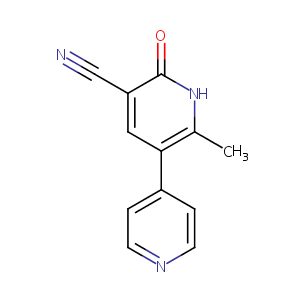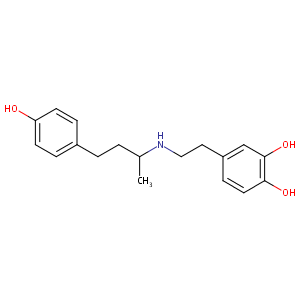| 1 |
ClinicalTrials.gov (NCT05267886) CAPITAL DOREMI 2: Inotrope Versus Placebo Therapy for Cardiogenic Shock
|
| 2 |
URL: http://www.guidetopharmacology.org Nucleic Acids Res. 2015 Oct 12. pii: gkv1037. The IUPHAR/BPS Guide to PHARMACOLOGY in 2016: towards curated quantitative interactions between 1300 protein targets and 6000 ligands. (Ligand id: 5225).
|
| 3 |
Milrinone FDA Label
|
| 4 |
URL: http://www.guidetopharmacology.org Nucleic Acids Res. 2015 Oct 12. pii: gkv1037. The IUPHAR/BPS Guide to PHARMACOLOGY in 2016: towards curated quantitative interactions between 1300 protein targets and 6000 ligands. (Ligand id: 535).
|
| 5 |
Drugs@FDA. U.S. Food and Drug Administration. U.S. Department of Health & Human Services.
|
| 6 |
The efficacy of preemptive Milrinone or Amrinone therapy in patients undergoing coronary artery bypass grafting. Anesth Analg. 2002 Jan;94(1):22-30, table of contents. doi: 10.1097/00000539-200201000-00005.
|
| 7 |
Adenosine receptors and phosphodiesterase inhibitors stimulate Cl- secretion in Calu-3 cells. Am J Respir Cell Mol Biol. 2003 Sep;29(3 Pt 1):410-8. doi: 10.1165/rcmb.2002-0247OC. Epub 2003 Apr 24.
|
| 8 |
Gene therapy in cardiac surgery: intramyocardial injection of naked plasmid DNA for chronic myocardial ischemia. Eur J Cardiothorac Surg. 2003 Nov;24(5):785-93. doi: 10.1016/s1010-7940(03)00455-x.
|
| 9 |
Beta-adrenoceptor alterations coupled with secretory response and experimental periodontitis in rat submandibular glands. Arch Oral Biol. 2008 Jun;53(6):509-16.
|
| 10 |
Catechol-O-methyltransferase: substrate-specificity and stereoselectivity for beta-adrenoceptor agents. Xenobiotica. 1986 Jan;16(1):47-52.
|
| 11 |
Molecular mechanisms controlling the rate and specificity of catechol O-methylation by human soluble catechol O-methyltransferase. Mol Pharmacol. 2001 Feb;59(2):393-402. doi: 10.1124/mol.59.2.393.
|
| 12 |
The Arg389Gly 1-adrenoceptor gene polymorphism influences the acute effects of -adrenoceptor blockade on contractility in the human heart. Clin Res Cardiol. 2011 Aug;100(8):641-7. doi: 10.1007/s00392-011-0288-1. Epub 2011 Feb 11.
|
| 13 |
Evaluating the Role of Multidrug Resistance Protein 3 (MDR3) Inhibition in Predicting Drug-Induced Liver Injury Using 125 Pharmaceuticals. Chem Res Toxicol. 2017 May 15;30(5):1219-1229. doi: 10.1021/acs.chemrestox.7b00048. Epub 2017 May 4.
|
| 14 |
Beta-adrenoceptor activation-induced placental prorenin secretion is mediated by increased renin messenger RNA and protein synthesis. Mol Pharmacol. 1997 Feb;51(2):201-8. doi: 10.1124/mol.51.2.201.
|
| 15 |
An in vitro coculture system of human peripheral blood mononuclear cells with hepatocellular carcinoma-derived cells for predicting drug-induced liver injury. Arch Toxicol. 2021 Jan;95(1):149-168. doi: 10.1007/s00204-020-02882-4. Epub 2020 Aug 20.
|
| 16 |
Myocardial ischemia induces interleukin-6 and tissue factor production in patients with coronary artery disease: a dobutamine stress echocardiography study. Circulation. 2005 Nov 22;112(21):3272-9. doi: 10.1161/CIRCULATIONAHA.104.532259. Epub 2005 Nov 14.
|
| 17 |
Catecholamines suppress leptin release from in vitro differentiated subcutaneous human adipocytes in primary culture via beta1- and beta2-adrenergic receptors. Eur J Endocrinol. 2000 Sep;143(3):439-45. doi: 10.1530/eje.0.1430439.
|
| 18 |
Refining the human iPSC-cardiomyocyte arrhythmic risk assessment model. Toxicol Sci. 2013 Dec;136(2):581-94. doi: 10.1093/toxsci/kft205. Epub 2013 Sep 19.
|
| 19 |
Investigation of imatinib and other approved drugs as starting points for antidiabetic drug discovery with FXR modulating activity. Biochem Pharmacol. 2012 Jun 15;83(12):1674-81. doi: 10.1016/j.bcp.2012.02.027. Epub 2012 Mar 7.
|
| 20 |
Adenoviral gene transfer of Akt enhances myocardial contractility and intracellular calcium handling. Gene Ther. 2006 Jan;13(1):8-19. doi: 10.1038/sj.gt.3302589.
|
| 21 |
Kallikrein gene delivery improves cardiac reserve and attenuates remodeling after myocardial infarction. Hypertension. 2002 Nov;40(5):653-9. doi: 10.1161/01.hyp.0000036035.41122.99.
|
| 22 |
Left ventricular contractile effects of inducible nitric oxide synthase in the human allograft. Circulation. 1997 Nov 18;96(10):3436-42. doi: 10.1161/01.cir.96.10.3436.
|
| 23 |
Effect of 393T>C polymorphism of GNAS1 gene on dobutamine response in Chinese healthy subjects. J Clin Pharmacol. 2009 Aug;49(8):929-36. doi: 10.1177/0091270009337945. Epub 2009 Jun 19.
|
| 24 |
A bivariate functional mapping model for identifying haplotypes that control drug response for systolic and diastolic blood pressures. Pac Symp Biocomput. 2006:572-83.
|
| 25 |
Chronic phospholamban inhibition prevents progressive cardiac dysfunction and pathological remodeling after infarction in rats. J Clin Invest. 2004 Mar;113(5):727-36. doi: 10.1172/JCI18716.
|
|
|
|
|
|
|


